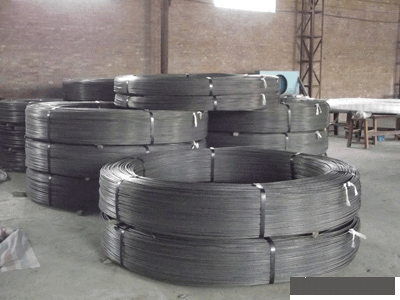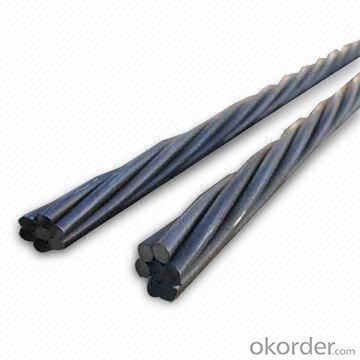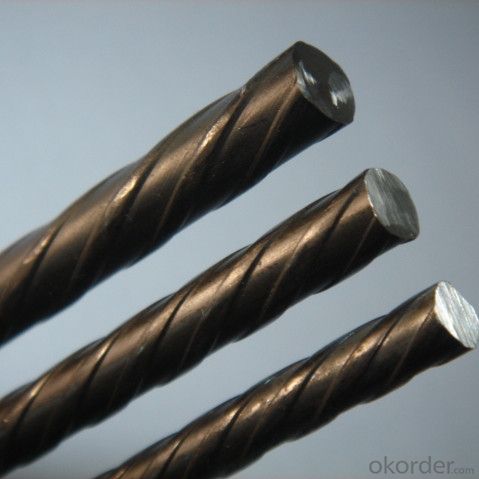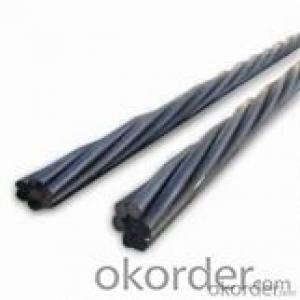High Tensile PC Steel Wire with Spirals
- Loading Port:
- Tianjin
- Payment Terms:
- TT OR LC
- Min Order Qty:
- 100 m.t.
- Supply Capability:
- 3000 m.t./month
OKorder Service Pledge
OKorder Financial Service
You Might Also Like
Product Description:
1、Structure of High Tensile PC Steel Wire with Spiral Ribs Description:
Prestressed Concrete Steel Wire, also named PC steel wire orPC wire, is made from high carbon steel with low relaxation high tensile strength. PC wires are sorted into plain surface PC wire, spiral ribs PC wire and indented PC wire. They are commonly used for concrete structure reinforcement such as highway, high-speed railway projects, large-span bridges, overhead crane beam, coal mines.
2、Main Features of High Tensile PC Steel Wire with Spiral Ribs:
•Perfect cohesion. Spiral ribs and indented surface can strengthen the bond between wire and concrete, thus it improves the performance of the PC products and extends its life.
•Low relaxation high tensile strength. With low relaxation 2.5% and tensile strength up to 1860Mpa.
3、High Tensile PC Steel Wire with Spiral Ribs Images:



4、High Tensile PC Steel Wire with Spiral Ribs Specification:
Quick Details
Steel Grade: 77B or 82B high carbon wire rod
Standard: GB
Wire Gauge: 4.0mm to 10.0mm
Place of Origin: Tianjin, China (Mainland)
Type: PC
Application: Construction
Model Number: 4.0mm to 10.0mm
Packaging & Delivery
| Packaging Details: | Each coil is strapped by steel bands and fully wrapped in anti-rust paper & P.P woven sheet. |
|---|---|
| Delivery Detail: | within three week after confirm the order or contract. |
The character of the spiral ribs wire is there are 3-6 protruding ribs on the surface.
The new product was invented by Silvery Dragon in 1991, and the research program of the product includes spiral drawing die, spiral deforming technique etc. 12 proprietary technologies. The product is characteristic of 3 to 6 spiral ribs through spiral deforming drawing on the surface of wire, increasing the bond ability with concrete and raising PC products properties. Since 1997, spiral rib PC wire has already fully took place of indented PC wire, and it has been applied in PC telegraph pole, PC hollow floor plate, PC sleeper, high-speed railway PC sleeper plate, PC water supply pipe etc. Since 1996, it has already been exported to the overseas market. In 2006, the product passed the examination and certificate on the properties by German TU Munich; now the product is applied by Great Britain, Ireland, Bangladesh, German, Poland, etc. more than 30 countries. The production of the product is according to Chinese GB/T5223-2002. Except the shape, other standards for mechanical properties are interchangeable with those popular in the world, or we can use the reasonable standard after consulting with customers.
5、FAQ of High Tensile PC Steel Wire with Spiral Ribs:
①How is the quality of your products?
Our products are manufactured strictly according to national and internaional standard, and we take a test on every pipe before delivered out. If you want see our quality certifications and all kinds of testing report, please just ask us for it.
Guaranteed: If products’ quality don’t accord to discription as we give or the promise before you place order, we promise 100% refund.
②How about price?
Yes, we are factory and be able to give you lowest price below market one, and we have a policy that “ for saving time and absolutely honest business attitude, we quote as lowest as possible for any customer, and discount can be given according to quantity”,if you like bargain and factory price is not low enough as you think, just don’t waste your time.Please trust the quotation we would give you, it is professional one.
③Why should you chose us?
Chose happens because of quality, then price, We can give you both.Additionally, we can also offer professional products inquiry, products knowledge train(for agents), smooth goods delivery, exellent customer solution proposals.Our service formula: good quality+good price+good service=customer’s trust
SGS test is available, customer inspection before shipping is welcome, third party inspection is no problem.
Any question, pls feel free to contact us !
- Q:What are the different methods of bending steel pipes?
- There are several methods of bending steel pipes, including manual bending, rotary draw bending, mandrel bending, and hydraulic pipe bending.
- Q:What are the different testing methods for steel pipes?
- Some of the different testing methods for steel pipes include non-destructive testing methods such as ultrasonic testing, magnetic particle testing, and radiographic testing. These methods are used to detect any defects or inconsistencies in the pipe's structure or material without causing any damage. Other testing methods include hydrostatic testing, which involves pressurizing the pipe with water to check for leaks or weaknesses, and mechanical testing, which measures the pipe's strength and durability through tensile, hardness, and impact tests.
- Q:How do steel pipes handle extreme temperatures?
- Steel pipes can handle extreme temperatures due to their high strength and thermal stability. The properties of steel, such as its excellent heat resistance and low thermal expansion, allow it to withstand both high and low temperatures without significant deformation or structural damage. Additionally, the use of specialized coatings and insulation can further enhance the heat resistance of steel pipes, making them suitable for a wide range of applications in extreme temperature environments.
- Q:What is a tight steel tube?
- The fully enclosed steel tube is called "sleeve connection steel pipe". The English abbreviation is JDG. The sleeve between the pipe and the pipe is fastened by screws. The current specification is the construction and acceptance rules of CECS 120:2007 sleeve steel conduit pipe line
- Q:What are the common grades of steel used in pipes?
- The common grades of steel used in pipes include ASTM A53, ASTM A106, and API 5L.
- Q:How are steel pipes used in the manufacturing of HVAC systems?
- Steel pipes are commonly used in the manufacturing of HVAC systems for various purposes. They are primarily used for transporting fluids such as water, refrigerants, and gases throughout the system. Steel pipes provide durability and strength, ensuring the safe and efficient transfer of these substances. Additionally, steel pipes are often used for structural support, acting as a framework for the HVAC system. Overall, steel pipes play a crucial role in the manufacturing of HVAC systems by facilitating fluid transportation and providing structural stability.
- Q:What quota should be installed for heating seamless steel pipe?
- Seamless steel pipe having a hollow cross section, used as a conduit for conveying fluids, such as pipelines for transporting petroleum, natural gas, gas, water, and certain solid materials.
- Q:What are the different types of steel pipe coatings for drinking water pipelines?
- There are several types of steel pipe coatings used for drinking water pipelines, including fusion bonded epoxy (FBE), polyethylene (PE), and polyurethane (PU) coatings. Each coating offers different advantages, such as corrosion resistance, durability, and smoothness, to ensure the safety and quality of drinking water.
- Q:Can steel pipes be used for sewage treatment plants?
- Yes, steel pipes can be used for sewage treatment plants. Steel pipes are commonly used in sewage treatment plants due to their durability, strength, and resistance to corrosion. They are suitable for transporting sewage, wastewater, and other fluids in these facilities.
- Q:What is the difference between steel pipes and FRP pipes?
- Steel pipes and FRP pipes are commonly used in various industries and applications, but they differ in several ways: 1. Material Composition: Steel pipes are constructed from iron and carbon alloys, along with elements like manganese, silicon, and small amounts of other metals. Conversely, FRP pipes consist of a polymer matrix reinforced with fibers such as glass or carbon. 2. Strength and Durability: Steel pipes are renowned for their exceptional strength and durability, enabling them to endure high pressures, heavy loads, and extreme temperatures. Although FRP pipes are also strong and durable, they are comparatively lighter in weight and may not possess the same level of strength as steel pipes. Nonetheless, they excel in corrosion resistance and have a longer lifespan in corrosive environments. 3. Corrosion Resistance: Steel pipes are susceptible to corrosion and thus require protective coatings or linings to prevent rust and deterioration. In contrast, FRP pipes possess inherent corrosion resistance and do not necessitate additional coatings. Consequently, they are well-suited for transporting corrosive fluids or functioning in corrosive environments. 4. Installation and Maintenance: Installing steel pipes necessitates specialized welding or threading techniques. Consequently, installation can be more labor-intensive and time-consuming, particularly for complex or large-scale projects. Conversely, FRP pipes are lightweight and easily transportable and installed. Often arriving in pre-fabricated sections, they expedite installation, reduce labor requirements, and demand minimal maintenance in comparison to steel pipes. 5. Cost: Generally, steel pipes are more expensive than FRP pipes due to the higher cost of raw materials and the need for additional corrosion protection measures. FRP pipes offer a cost-effective alternative, particularly in applications where corrosion resistance is paramount, as they eliminate the necessity for expensive coatings or linings. Ultimately, the selection between steel pipes and FRP pipes depends on the specific requirements of the application. Steel pipes are favored for their high strength, whereas FRP pipes offer advantages such as corrosion resistance, lightweight construction, and cost-effectiveness.
1. Manufacturer Overview |
|
|---|---|
| Location | |
| Year Established | |
| Annual Output Value | |
| Main Markets | |
| Company Certifications | |
2. Manufacturer Certificates |
|
|---|---|
| a) Certification Name | |
| Range | |
| Reference | |
| Validity Period | |
3. Manufacturer Capability |
|
|---|---|
| a)Trade Capacity | |
| Nearest Port | |
| Export Percentage | |
| No.of Employees in Trade Department | |
| Language Spoken: | |
| b)Factory Information | |
| Factory Size: | |
| No. of Production Lines | |
| Contract Manufacturing | |
| Product Price Range | |
Send your message to us
High Tensile PC Steel Wire with Spirals
- Loading Port:
- Tianjin
- Payment Terms:
- TT OR LC
- Min Order Qty:
- 100 m.t.
- Supply Capability:
- 3000 m.t./month
OKorder Service Pledge
OKorder Financial Service
Similar products
New products
Hot products
Related keywords





























